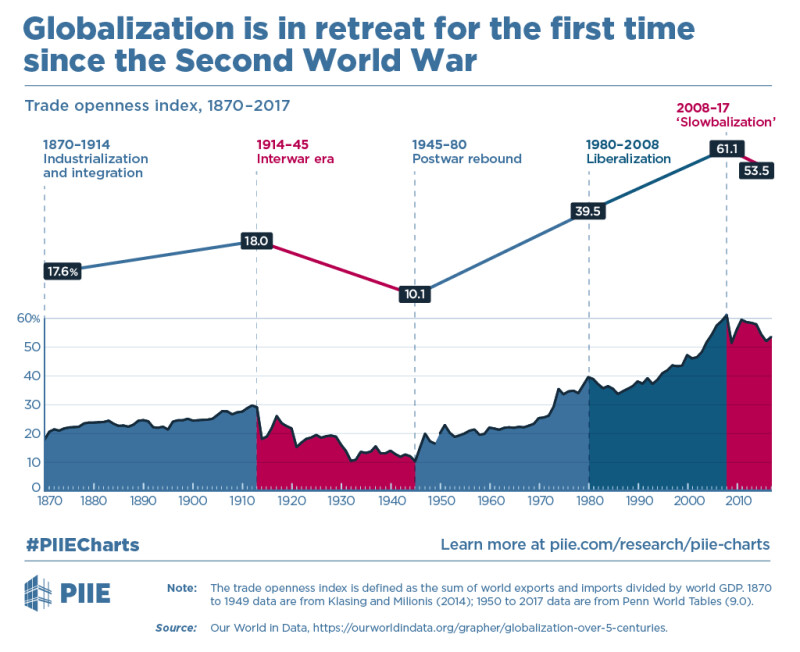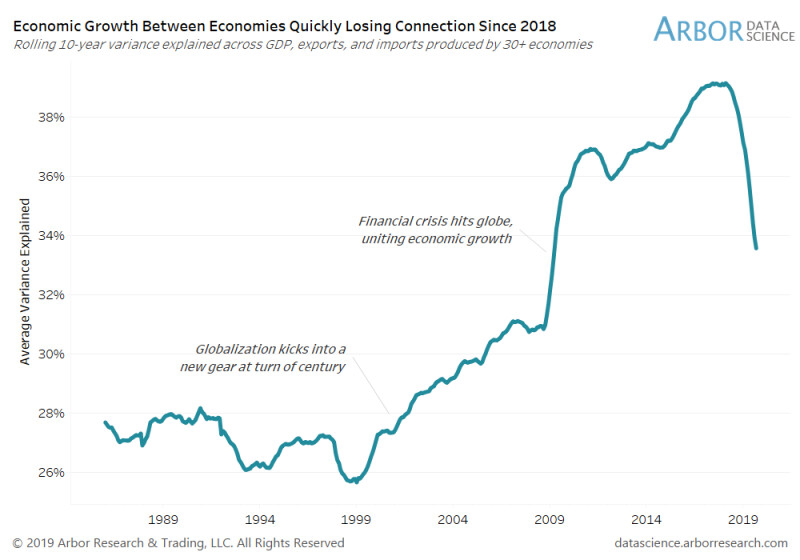
Sharon J. Crino, Executive in Residence
Dr. Shyam J. Kamath, Dean and Professor
College of Business
California State University, Monterey Bay
While the global pandemic has had a huge impact in shutting down globalization, the international movement of goods, service, materials, and people was in trouble long before it hit us. The open system of global trade, investment, and peoples’ freedom of movement between countries that had become increasingly dominant since the end of the Second World War was substantially damaged by the global financial crisis of 2007-2008 and the China-U.S. trade war. The pandemic dealt this system a serious blow with lockdowns, sealed borders, and disrupted trade and investment. A May 2020 survey of the members of the Global Business Alliance, a group of multinational corporations and international companies, revealed that 77 percent of the members expected the U.S. to become more protectionist on a number of variables such as trade, mergers and acquisitions, and government procurement.
Slowed Globalization
The slowdown in globalization (sometimes called ‘slowbalization’ instead of deglobalization) is reflected in the two charts below. The first chart, from the Peterson Institute for International Economics, shows how the Trade Openness Index (defined as the sum of world exports plus world imports divided by world GDP) has fallen during the 2008-2017 period from a high of 61.1 to 53.5, for the first time since the end of World War II, starting with the global financial crisis in 2007-2008.

The second chart, below, shows how the global pandemic has accelerated the trend by looking at how the variance in the correlation of GDP, exports and imports has gone down, reflecting a steep drop in globalization just before and after the pandemic. A number of factors have been at work. One major factor is that the growth of global supply chains has turned downward.

Adaptation and Transformation
Although international supply chains and investment patterns are expected to shrink, they are also expected to adapt and transform. Regionalization of trade and investment, the reconfiguration of supply chains, the reorientation of production locations (including but not limited to localization), and the need to deal with home country-focused regulation will place global, regional, and cultural management skills at a premium.
A company’s management of global and regional operations will remain one of the most critical areas impacting all facets of its business in a deglobalizing and restructuring world. Global and regional operations will remain at the epicenter of the company, and having the right people with the right knowledge and skills, both hard and soft, will remain major factors of success in our transforming world.
The Components and Importance of Global and Regional Operations
As part of discussing ‘managing global operations,’ it is important to start by understanding the components and importance of global and regional operations. Depending on the company, services, products, and staffing, among other areas, this can be simple or extremely complex. Generally, it is a complex process due to the number of coordinating elements required across company disciplines and worldwide differences in product development, from concept to end-of-life. These differences have been accentuated by the increasing role of governments and home country-focused consumers. The flexible and complex skills of global operations management have become critical for success.
Regionalization has become an important factor as well. Companies must become adept at managing interconnected global and regional management networks. Regional operations skills can be considered a subset of global operations skills, imbued with a new emphasis due to the trends of deglobalization and regionalization. The formation of trading blocs—the Mexico-Canada-America (MCA) Agreement bloc, the European Union, the Asian trading bloc, and the newly coalescing China-influenced trading blocs in Asia and Africa—has increased the need and complexity of global and regional operations.
Cohesive Business and Strategic Plans
Global and regional operations represent a multifaceted set of activities that require a comprehensive understanding of international and regional economic organizations, individual and regional business cultures, and country and pan-country cultures. They also require the ability to tie these elements together, creating cohesive business and strategic plans that meet the needs of a company’s global and regional aspirations. Critical components include the appropriate organizational structure; determining product standards; understanding regional and local rules, regulations, and market conditions; and flexibility in execution globally, regionally, and locally. While each person and group brings something to the table, it is the responsibility of the managing team to make sure that the strategy can be articulated and executed globally and regionally. It is also critical to review current policies and procedures in the context of global and regional strategy, to ensure they are meeting or exceeding the needs of, and preparing for the changes in, these strategies. All of these steps require seamless yet interconnected management in order to create and execute a sound, well thought-out, successful global and regional strategy.
As we can see in our current environment, the global landscape can change in a minute. Those companies that are able to adjust to global and regional changes with a creative and flexible strategy that can be quickly executed will have the advantage going forward.
Necessary Skills and Experience
As we pay attention to deglobalization and regionalization, it is important to understand the skills and experience that are required to be successful. To embark on a career in the global and regional arena, individuals must assess their understanding of the skills required and develop their own skills, capitalizing on their strengths and honing areas that need strengthening. In many cases, connecting with an individual who is experienced in a specific regional and local environment can help navigate the waters. Going through this process will be beneficial as you determine where your skills and interests fit into this sector and how you can bring value to your organization, team, and strategy. Having well-trained regional and local managers is a key asset.
Essential Components of a Strategy’s Success
In the world of global and regional business, some areas are essential to success. Organizations and individuals can learn from personal experience, local and regional expertise, and events happening in the regional and global arena. There is a great deal to be gained from analyzing the successes and failures of companies in global and regional contexts.
No matter how strong an individual team or department is, an interconnected global and regional strategy will not succeed without the following elements:
- A clear understanding of the agreement and execution of long- and short-term company strategy in local, regional, and global contexts
- Understanding, on the part of all functional departments, of the strategy and the ramifications of success and failure, globally and regionally
- A clear understanding of customers in each country and region; their needs, strengths, weaknesses, and their strategic plans
- The right partners globally, regionally, and locally
- Clearly articulated global, regional and local road maps for all parties
- Clear global, regional, and local marketing strategies that include:
- Understanding of languages and translation challenges
- Deep cultural understanding (individual country, pan-country, and regional)
- Risk assessment
- Brand strategy cued into local and regional cultures and conditions
- Flexible project and process planning and management
- The right people, including local and regional talent, in the right place at the right time
- A clearly defined exit plan
Looking Ahead
As is evident from current events, today’s business environment can and will probably change more quickly and drastically than expected. Companies with clear, long-term visions of where they want to go and how to get there can reap great success. Conversely, even very successful companies may struggle to keep up with this new, changing environment. It all comes down to how you manage global and regional operations in an interconnected world. Of particular importance is the understanding of the benefits and risks of reconfiguring global supply chains in a deglobalizing and regionalizing world.
As you continue on your journey and observe our changing world, keep in mind that it has been embedded in globalization for too long to change course easily. However, significant changes are necessary in order to deal with the trend toward regionalization and localization. Although these changes will not end globalization, they’ll temper it and alter how and with whom we will engage as business partners. Every company is involved in this global pandemic and will have to choose a different path after the dust settles, if it does. Some approaches will be successful and others not. When the pandemic ends, take a look around and analyze the successes and failures that you see. This will give you the opportunity to make wise choices in the company you select and the new path you ultimately take. Deglobalization and regionalization are here to stay for a while
Make your mark on the world of business.
Develop your skills and transform your career with the Online MBA from California State University, Monterey Bay. Its emphasis on responsible business will help you become a successful leader locally, regionally, and globally.
About the Authors
Sharon Crino is an experienced senior international operations executive who served as General Manager and Corporate Vice President, Health Imaging at Eastman Kodak Company, where she served for 30 years. Ms. Crino led the digital transition of Kodak’s second-largest business (Health Imaging) for Europe, Pacific, Middle East, Asia, and Russia, regions comprised of more than 50 countries. She held numerous executive positions within Kodak in the areas of sales, marketing, manufacturing, operations, and management. Other positions at Eastman Kodak included Executive Liaison to the European Union for all Eastman Kodak’s European Business Units, Health Imaging Liaison for the European, Pacific, Middle East and Asia’s Executive Senior Management Teams, and Member of the Global Merger and Acquisitions Executive Team. After leaving Eastman Kodak, Ms. Crino held senior management positions at the American Red Cross, Monterey Peninsula College, and CASA. Ms. Crino currently serves on the Community Health Innovations Board, Montage Health, Monterey, CA, and on the Business Advisory Council of the College of Business at California State University, Monterey Bay. She is currently Executive in Residence at the College of Business at CSUMB.
Shyam Kamath, Ph.D., is the founding dean of the College of Business at CSUMB. He has more than 35 years of experience in international management, international economic development and education, sustainable enterprise formation, global business consulting, and university teaching. He has held academic and administrative positions at leading universities in the U.S., Canada, Asia, and Europe. During his business career, he served as an international business executive and management analyst for an affiliate of Toshiba of Japan, the Indian Planning Commission and the international energy equipment manufacturer, BHEL, where he managed international operations and strategic planning functions. He is the co-founder of three startups and serves on the boards/advisory councils of the Hope Collaborative, Rancho Cielo, MBEP’s Techno-economic Committee, Hartnell College Foundation’s Strategic Planning Committee, and CSUMB’s College of Business Advisory Council and Sustainable Hospitality Management Council. He also serves on the advisory board of the for-profit company, LeaderJam. Previous board memberships include the Monterey Peninsula Chamber of Commerce, the Monterey International Jazz and Music Experience (as CEO), Tetrex International Corporation (as EVP), IndStar LLC (as SVP), Engineering Project Consultants and International Consultancy Services Associates.
